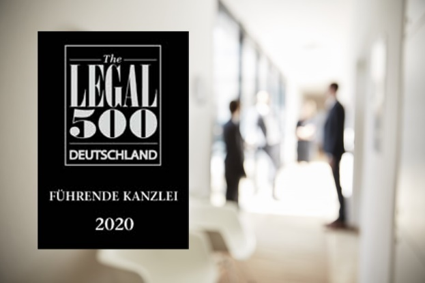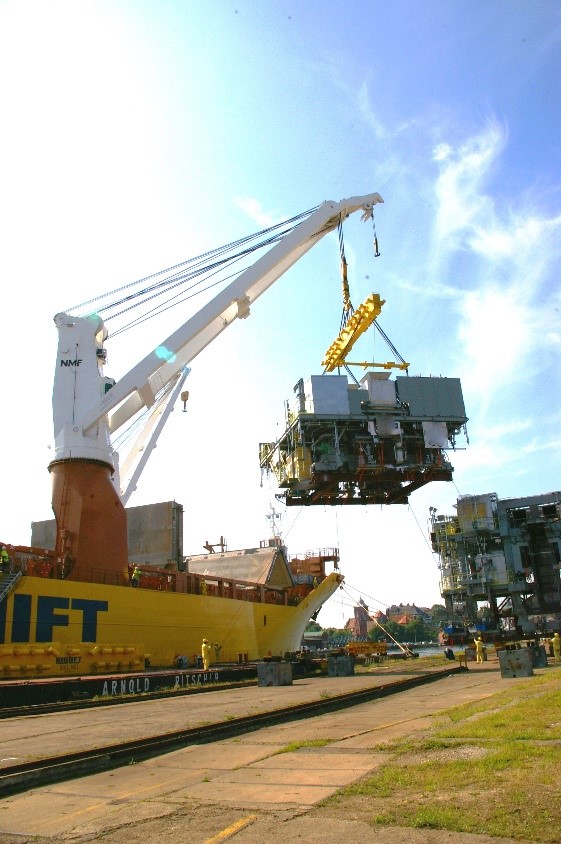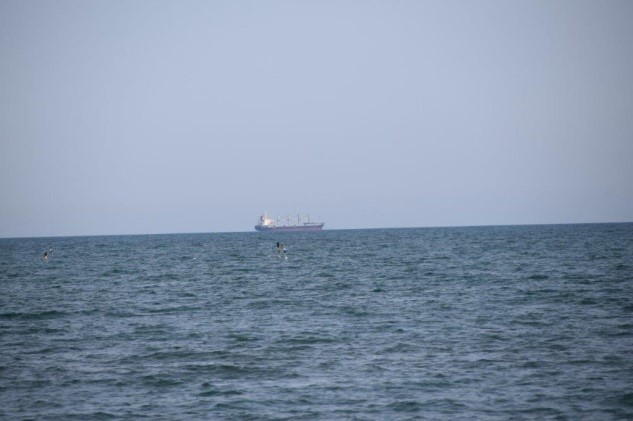In our latest issue of Business law Briefings, we look at the liability of the German ocean carrier. Hapag Lloyd, Hamburg Süd and others play a not insignificant role as ocean carriers on the world market. In their B/L conditions, they often provide for the applicability of German law and a place of jurisdiction in Germany. Reason enough to take a brief look at the liability of these carriers.
Legal 500, one of the leading international law firm rankings, in 2020 again ranks KUSS Rechtsanwälte among the best commercial law firms in Germany in the field of Transport Law.

Based on its research in the editorial section Legal 500 has come to the conclusion (our translation):
„Kuss Rechtsanwälte Partnerschaft mbb is highly specialized in the field of International Transport, Forwarding and Warehousing Law. The focus of activities of the four-member team of bar certified specialists (Fachanwälte) lies in complex cases of major transport damage as well as in the conduct and defense of recovery claims. In addition, the team around Robert Kuss and Corinna Kuss advises policyholders and insurers on transport insurance coverage. A particular added value regarding the international activities of the law firm lies in the legal advice and consulting offered in English, French, Italian, Spanish and Russian.”
We were particularly pleased with the references:
„The law firm is very competent, reliable and always adheres to the given schedules. In addition, the team is characterized by patience and perseverance even in stressful situations.”
„The law firm is our first address in Germany in the field of Transport Law. Especially in the field of road transport the team is unbeatable in terms of efficiency, transparency, expertise and experience.”
‘Robert Kuss is outstanding in competence and client service and has excellent negotiating skills.”
You can find the ranking under the following link:
https://www.legal500.de/c/deutschland/transport/transportrecht/
According to the case law of German courts, damage to transported goods is to be assumed if damage could have occurred as a result of an event, even if it is not externally recognizable.

The interests of both sides are clear: no consignor wants to guarantee that goods that have not been transported as planned are actually undamaged. The carrier on the other hand does not want to pay compensation if the goods are not noticeably damaged. Typical examples are tilted sensitive machines, moisture damage and temperature deviations in pharmaceuticals or foodstuffs.
German case law considers a well-founded suspicion of damage to be damage to transported goods.
In a fundamental, very comprehensible decision, the Federal Court of Justice (BGH) has clarified for German law and the application of international conventions in Germany that indemnifiable damages can also be assumed to exist without any established substance damage solely on the basis of a well-founded suspicion of damage to the object. In this case, the owner must have the object examined for such damage in order to remove the suspicion of damage or to be able to repair the object. The inspection costs shall also be reimbursed if the inspection leads to the conclusion that there is no damage. If the probable examination costs exceed the value of the object, the BGH is of the opinion that an economic total loss of the object is to be assumed even without an established substance violation, cf. BGH, TranspR 2002, 440.
The Regional Court of Hamburg has consistently taken up this thread and decided that the expiration of the factory guarantee of a transformer due to a considerable impact leads to a total loss of the transformer. This is the case even if the transformer should retain its physical functionality without impairment despite the impact, see Landgericht Hamburg, RdTW 2019, 143 ff.
Robert N. Kuss, LL.M. oec.
A breach of specific contractual agreements constitutes qualified fault and leads to unlimited liability of the carrier.

In legal proceedings conducted by us before the Hanseatic Higher Regional Court (Hanseatisches Oberlandesgericht) of Hamburg, the court again clarified in a notice in June of this year that a breach of specific contractual agreements constitutes qualified fault.
The case concerned a consignment of cigarettes to be transported within Germany. During a stop on an unguarded motorway station over the weekend, the trailer was cut open and a considerable number of cigarettes were stolen. However, it was contractually agreed between the shipper and the carrier that overnight stops were only permitted with the shipper’s prior consent. The Higher Regional Court (Oberlandesgericht) of Hamburg, which only rarely assumes a qualified fault, saw the breach of this clear regulation as a qualified fault leading to unlimited liability.
In the same way the Regional Court (Landgericht) of Bremen decided a few months earlier in its judgement of June 6, 2018, file no. 11 O 169/17: Clauses in a transportation contract according to which stops are only permitted on guarded and video-monitored parking lots are valid. If the carrier does not adhere to these requirements, he acts, according to the judgment, at least recklessly and is liable without limitation.
Consignors of theft-prone goods should therefore agree in the contract that only guarded parking lots are permitted for stops, and carriers, if they consent to such agreements, should inform their drivers or subcontractors accordingly, otherwise unlimited liability is imminent.
Robert N. Kuss, LL.M. oec.

Under German law such clauses in the bill of lading terms and conditions are ineffective. The delivery of cargo requires that the consignee is put in a position to take possession of the goods and that he indicates his willingness to take possession. Terms and condi-tions of a bill of lading cannot facilitate delivery unilaterally, as this would undermine lia-bility for proper delivery. This, however, inevitably presupposes that the consignee is informed where and when he can collect the cargo.
The Higher Regional Court of Thuringia recently informed the plaintiff in a litigation relat-ing to that question that his appeal had no chance of success. (Decision of June 25, 2019, Ref.: 7 U 119/19.) The first instance had decided that the carrier has to repay the demurrage costs.
Maxim Miskewych, Attorney at law and bar certified specialist in international business law
Maxim Miskewych was awarded the title of a Certified Specialist for International Business Law by the Cologne Bar Association.

Prior to achieving the status of specialist, the lawyer has to attend a 120 hour specializing course and pass several examinations. Moreover, the handling of a certain number of cases in the specialized area must be proven. A lawyer bearing the title “bar certified specialist” has to prove every year to have further expanded his expertise to the prescribed extent.
The German Rules on Bar Certified Specialist Lawyers (Fachanwaltsordnung) provide for a bar certified specialist in international commercial and business law to demonstrate special knowledge in the areas of
- conflict of laws of contractual and non-contractual obligations,
- international civil procedure and arbitration law,
- internationally harmonized commercial law,
- internationally harmonized corporate law,
- European state aid and competition law,
- main features of the regulations on the fight against corruption, fraud and money laundering in international legal transactions,
- main features in the realm of international tax law,
- main features of comparative law.
We congratulate Maxim Miskewych on successfully obtaining this title, which documents his remarkable competence in this demanding and important field of law.
According to a recent judgement of the Regional Court (Landgericht) of Bremen, a transport liability insurer cannot invoke a prohibition of assignment, if this would result in the policyholder becoming insolvent as a result of the insured transport damage.

In the case decided by the Regional Court of Bremen, our client, the customer of a carrier specializing in the transport of heavy goods asserted claims for damages due to a business interruption at an aluminum factory. The rectifier carried to the factory had collided with a bridge during the transport. The unit could not be delivered. The consignee suffered a considerable reduction in production capacity for months. The insurer initially refused to release its policyholder. Due to the damage amounting to millions, this would have inevitably resulted in the carrier’s insolvency. In this situation, the carrier decided to compensate part of the loss and to assign its coverage claims against its insurer to the claimant in the course of a settlement.
As expected, the sued insurer invoked the prohibition of assignment.
The Regional Court decided that as assignee the injured party had become the owner of the claims. This was not opposed by the prohibition of assignment effectively agreed in the insurance contract. However, on the basis of good faith, the insurer was prevented from invoking the prohibition of assignment. In the decided case, there was clearly a risk that in the course of a liability lawsuit against the carrier, the claimant would ultimately run idle due to insolvency. In the end, only a claim for assignment against the insolvency administrator would have remained for the claimant, cf. judgement of the Regional Court (Landgericht) of Bremen of November 6, 2018, file no. 11 O 226/15 (final and absolute).
Accordingly, since the exclusion of the assignment provided for in the insurance contract would have led to the same result as a direct claim against the insurer, but at the price of the insolvency of the policyholder, the insurer could not invoke the prohibition of assignment.
Robert N. Kuss, LL.M.oec.
According to a judgement of the Local Court (Amtsgericht) of Cologne (legally binding), in the event of delayed delivery of baggage, the air carrier must pay compensation in the amount of the costs of necessary and appropriate replacement in accordance with Article 19 of the Montreal Convention. The traveler must accept the benefit of the purchased replacement clothing to be offset in the amount of 15% of the purchase price. (AG Köln, file ref.: 119 C 51/13, judgement of 03.06.2013, legally binding after dismissal of the appeal by resolution pursuant to Section 522 of the German Code of Civil Procedure (ZPO).

In the judgment cited above, the Local Court of Cologne decided how this benefit resulting from the newly purchased clothing is to be taken into account in the assessment of damages.
This decision had to be obtained on our own behalf. I flew from Cologne/Bonn airport to Zurich/Kloten on a Sunday at 4:55 p.m. to give a lecture on international contract law at 9:00 a.m. on Monday. I checked in my wardrobe, consisting of suit, shirt, tie, underwear and socks, packed in a garment bag. After my arrival in Zurich I waited in vain at the baggage carousel for the garment bag, went to the Lost & Found counter and was informed that my garment bag was still in Cologne. An arrival of my wardrobe for the lecture the next morning was not to be expected any more.
Since I didn’t want to give my lecture in casual clothes, I went to a clothing store at the airport and bought a new suit including shirt, tie, underwear and socks for about 1,000 Swiss francs, and considering the time and place of the purchase this was in the lowest price segment. A purchase in another shop before 09:00 the next morning was not possible.
The airline reacted with rejection to the assertion of the purchase price as damage. After several months of waiting for an amicable settlement, the claim for damages had to be filed in court, as the airline was of the opinion that I would have needed a suit anyway.
The court saw this differently. It justified its decision with the fact that the purchase of a suit as well as of the other pieces of clothing was necessary in view of the cause of the journey – a lecture. Due to the day of the week and the date of the lecture the next morning, there had been no cheaper shopping possibilities. A claim for compensation of the purchase price was also not excluded on the grounds that I had saved the purchase of another suit by purchasing this suit. The court stated that it is to be assumed that an acute need for wardrobe does not exist, when going on a job-related lecture journey. The traveler must, however, accept a benefit sharing for the acquired clothing to be offset, which is to be estimated here at 15% of the purchase value. This estimate is based in particular on the regularly very low resale value of used clothing.
The airline had not demanded the return of the suit and the undergarments before and during the proceedings, so that in the opinion of the court there was no claim for handover of the suit concurrently against payment of the total price.
ROBERT N. KUSS, LL.M. oec., Bar certified specialist in international business law,
Bar certified specialist in transportation and forwarding law
She’s on everyone’s lips these days. At the beginning of January, one of the world’s largest container ships, the MSC Zoe, lost about 300 containers on her way from Antwerp in Belgium to the German port of Bremerhaven in the German Exclusive Economic Zone, including some with hazardous goods. The search for and salvage of the containers is currently in progress. But who is actually liable in the event of container loss?

Am I allowed to pick up stranded goods and keep them?
After the abolition of the stranding regulations (Strandungsordnung), the law on finding of the German Civil Code (Fundrecht) applies in Germany. The owner therefore remains the owner of the cargo even if he does not know in detail where the cargo is located. If the cargo is washed up on the beach and found there by third parties, the finder must always report the discovery to the owner or another authorized recipient (e.g. coastguard / authority). If the finder retains the found cargo, he may render himself liable to prosecution for misappropriation in accordance with Section 246 of the German Criminal Code (StGB). However, this is governed very differently on an international level.
Are the owners entitled to compensation for loss or damage?
In principle, carriers/shipping companies or (fixed cost) forwarding agents are liable, regardless of fault, for damage caused by loss of or damage to the cargo during carriage. The owners or cargo interests are therefore generally entitled to compensation claims against the carrier or freight forwarder, which may be limited in amount. The responsible carrier is only exempt from the obligation to pay compensation if it can prove one of the reasons for exclusion of liability provided for in maritime law. The carrier can only invoke bad weather and even storm if the particularly bad weather conditions in this area were not to be expected at this time of year. Given the accuracy of today’s weather forecasts, this is likely to apply only in exceptional cases.
Who is liable for damage to ships that collide with the containers?
Another problem of container loss at sea is the fact that many containers float a few centimeters below the water surface in the sea and do not sink to the seabed. Since the danger is so hardly recognizable, it happens that ships or boats collide with containers. This can have fatal consequences, especially for recreational craft and smaller ships. The owners of ships that are damaged by colliding with containers are generally not deprived of their rights. They may be entitled to claims for damages in tort against the shipping company, the owner of the container ship or the owner of the containers if the containers were not or not properly stowed and secured on the container ship and/or the container ship itself was not seaworthy and/or the salvage of the container was culpably omitted. In such cases, however, it is problematic to identify the container and locate the person responsible.
Who is liable for the clean-up costs/environmental damage?
As a matter of principle, the “Stoerer” (disturber) is obliged to remove the (environmental) damage he has caused. The legally not conclusively defined term “Stoerer” is partly differently understood in the German jurisdiction, so that the determination of the responsible person is possible only with the knowledge of all circumstances of the individual case. In the case of MSC Zoe, the carrier, the shipowner and the owner of the cargo can be considered as obligated parties to remedy the damage.
Maxim Miskewych, Rechtsanwalt
According to a judgement of the Regional Court (LG) of Cologne achieved by us, the carrier has unlimited liability if he has failed to check whether all four support stands have been folded out before parking a swap body.

The Regional Court of Cologne (judgement of 20.12.2018, ref. 85 O 22/17, not yet legally binding) has decided that the parking of a swap body without prior control of whether all four support stands are folded out is a reckless fault.
The transport insurer of a designer furniture manufacturer had sued. The furniture had been sold and stowed in a swap body for transport. The driver of the transport company first took the swap body to his own premises to park it there. In the course of the procedure, it turned out that the driver had accidentally folded out only three stands of the swap body instead of all four. When being questioned, the driver stated that he had failed to extend the fourth stand because he was in a hurry. After the truck drove out under the swap body, this overturned and the goods were damaged.
The Regional Court of Cologne considered the driver’s conduct to be a reckless fault – and not, as the defendant claimed, a possibly excusable “Augenblicksversagen” (mistake made in the heat of the moment). Accordingly, the defendant could not invoke the limitation of liability of Section 431 of the German Commercial Code (HGB) in the amount of approx. 10.00 €/kg. In the court’s opinion, parking a swap body is a particularly damage-relevant procedure. Here the driver does not only have to provide for the necessary stability of the swap body, but beyond that pulling out the vehicle, on which the body was transported, requires a high concentration of the driver. According to the court, the damages that threaten to occur in the event of a handling error are considerable. In this case, the driver had grossly neglected to pay the necessary attention, as he had failed to do the most obvious thing, namely folding out all four supports of the container.
Do you have any questions concerning the carrier’s liability? We will be happy to answer them.
Vanessa Steinbacher, B.A., Attorney at law (Rechtsanwältin) and bar certified
specialist in transportation and forwarding law
